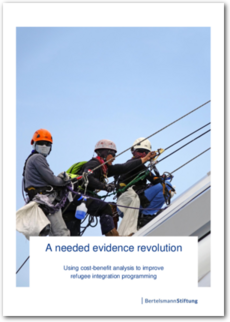Using cost-benefit analysis to improve refugee integration programming
- Ausgabeart
- Erscheinungstermin
- 12.07.2018
- DOI
- 10.11586/2018032
- Auflage
- 2. Auflage
- Umfang/Format
- 53 Seiten, PDF
Format
-
PDF
Preis
kostenlos
Beschreibung
Many Western European countries have dramatically ramped up spending on integration in the hope it will help the large numbers of recently arrived refugees find work and settle into their new societies. But very little is known about how best to target these investments. Governments have little hard evidence of what constitutes value for money in integration, in part because investments rarely pay off right away; it can take years or even generations for their full effects to be felt. There is also a dearth of high-quality evaluation to suggest which types of interventions—from subsidised work experience to training programmes—work best. Very few evaluations of integration policies can prove that the outcomes observed are the result of the intervention, and even most high-quality evaluations only look at the short-term effects of policies and programmes.
This report outlines ways policymakers can use a tool often employed by economists—cost-benefit analysis—to calculate the broader social value of their labour-market integration investments and to improve the quality of evidence in this field. Established methods from policy areas such as health and criminal justice are used where—like integration—spending may only pay off over a long timeframe. Such methods allow researchers to model the likely long-term outcomes of interventions, even in the absence of robust evaluation evidence on such interventions, or where initiatives are simply brand new. In other words, it allows decisionmakers to say: if a training programme has its desired effect, for every X euros of investment the programme is expected to produce a Y euro return over a 30-year time period.
Benton, Meghan; Diegert, Paul: What work for refugees - Using cost-benefit analysis to improve refugee integration programming. 1st edition 2018. DOI: 10.11586/2018031 is no longer available.


 >
>


